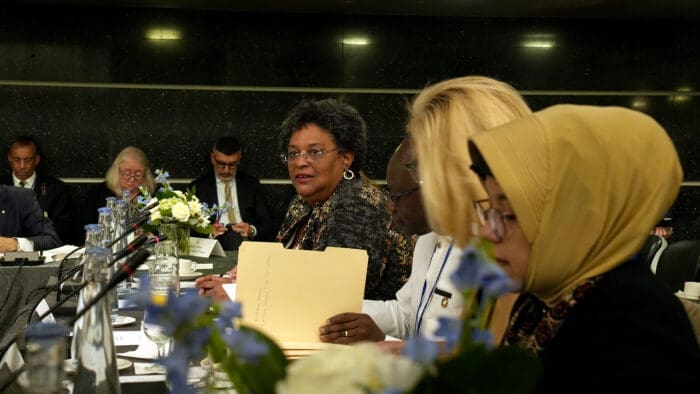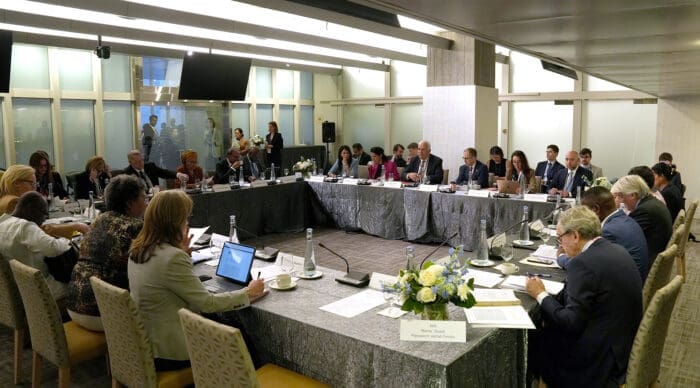
On April 13, during the 2022 Spring Meetings of the International Monetary Fund (IMF) and the Boards of Governors of the World Bank Group (WB), we convened a ministerial of governments, the United Nations, and philanthropies to discuss the urgent and ongoing crises that the world is facing.
With broad recognition of the shortcomings of the current international development finance system to deliver on the objectives of the 2030 Agenda for Sustainable Development, the Paris Agreement, and the Kunming-Montreal biodiversity framework, there have been a number of efforts to propose concrete, ambitious reforms to the system. Barbados Prime Minister Mia Mottley, United Nations Deputy Secretary General Amina Mohammed, and a number of others developed a proposal – the Bridgetown Initiative. In parallel, U.S. Treasury Secretary Janet Yellen has launched an initiative to evolve the multilateral development banks (MDB). A number of complementary efforts are also in motion, including the V20 Accra to Marrakech Agenda, the G20 Capital Adequacy Framework Independent Review, the Economic Commission for Africa Ministerial, and the G20 Note on the Global Debt Landscape. To advance these ambitious agendas, France will host, in June in Paris, a Summit for a “New Global Financial Pact” prepared in close collaboration with India and with key stakeholders leading these initiatives.
To build a fit-for-purpose international development finance architecture, a clear, coherent package of meaningful reforms and a unified, proactive, and determined coalition are needed.
This statement captures important areas reflected in our ministerial discussion:
- Vulnerable people in developing countries have been hit the hardest by the compounding overlapping global crises, leading to the reversal of development gains and catastrophic human consequences. These multiple crises are expected to add another 75 to 95 million people living in extreme poverty, as compared to pre-pandemic estimates.
- To improve their outlook and achieve sustainable development in all developing countries, it is essential to address these crises. To prevent a spiral of worsening climate vulnerability and rising debt, the international community must invest heavily in development and resilience.
- Climate change is already having a significant impact on livelihoods, food security, housing, and health, particularly in vulnerable communities around the world. We acknowledge the impacts of climate change are likely to make existing inequalities worse. The protection of human capital must be overarching, ensuring the most vulnerable communities have access to the resources and support they need to continue developing while building resilience against the impacts of climate change.
- Many countries have insufficient fiscal resources to finance much-needed responses to the health and socioeconomic crises caused by the pandemic and exacerbated by the war in Ukraine, as well as crucial investments in climate adaptation. The service of public debt crowds out room for crucial investments that countries require to establish a resilient, sustainable, and equitable recovery, climate-proof their economies, and achieve the Sustainable Development Goals (SDGs).
- Put bluntly, development and climate finance are not near available, affordable or accessible enough. We need to deploy more innovative development and climate finance with due attention to the risks of further increasing levels of indebtedness.
- Yet, many pledges on climate finance remain unfulfilled and, as the impacts of climate change escalate, many vulnerable developing countries continue to fall deeper into debt, which has been aggravated by Covid-19, the brutal war against Ukraine, the food emergency, a deepening cost-of-living crisis, and rising interest rates.
- No country or economy can alone overcome the climate crisis, the effects of the Covid-19 pandemic, the food and energy emergency, or the SDG gap.
Urgent, ambitious collective action is critical.
- The MDBs must update their mission, incentives, and operational approaches to better address global challenges in order to deliver their core objectives to reduce poverty and achieve SDGs.
- A significant scaling up of the MDBs is necessary – to dramatically increase the quantity and quality of financing available to low- and middle-income countries – while protecting their triple-A credit-ratings, long-term financial sustainability, and preferred creditor status. This evolution will enable MDBs to be more responsive to global challenges, including by providing more financing to LICs and MICs to address poverty, economic growth, climate vulnerabilities, and other transboundary and global challenges.
- MDBs must dramatically boost their financial capacity, including by stretching their existing financial resources, especially through aggressive implementation of the G20 recommendations on capital adequacy frameworks and of modernized 21st-century balance sheet practices.
- This expanded capacity must also come from a strengthening of IDA, through stretching its existing resources and mobilizing additional donor contributions, while pursuing a strong IDA21 replenishment in 2024.
- Even considering the contributions from stretching the current resources, additional public and private capital will also be needed to fulfill the ambitions of the SDGs and the UNFCCC Paris Agreement. At the same time, MDBs need to mobilize more private capital, including by using innovative new financial instruments (for example, new guarantees to reduce risk premiums related country and currency risks), adjusting internal targets and workforce incentives, and overhauling bank practices and procedures.
- MDBs must also thoroughly review their operational model to increase their efficiency and impact and ensure the best use of resources, including through enhancing coordination among MDBs and streamlining operations of the various administered funds. Country’s development strategies, Nationally Determined Contributions (NDCs), national roadmaps, and implementation plans are central to guide the deployment of resources in the field.
- Efforts to engage credit rating agencies must be strengthened to ensure equitable treatment of developing countries (reflecting their economic fundamentals), as well as to integrate a deeper appreciation of the limited risks faced by MDBs – thus offering more space on MDB balance sheets.
- Developing countries face severe challenges in managing public debt while interest rates are increasing, which can restrict efforts to leverage additional financial resources for the post-pandemic, green and sustainable recovery of the developing world. To respond quickly to the spiraling debt crisis, the International Monetary Fund should raise access limits for the most vulnerable and poorest countries and bolster the Poverty Reduction & Growth Trust (through seeking further donor contributions and considering the use of internal IMF resources). The IMF should also proactively consider temporarily suspending surcharges on lending, and review other ways to enhance its lending toolkit (including concessionality and longer maturities).
- The international community needs to urgently improve the conditions for coordinated efforts of debtors and creditors to achieve sound debt management, reduce debt vulnerability, improve debt transparency, and attain long-term debt sustainability. At the same time, methods for debt sustainability analysis should be improved, including by better integrating climate-related risks and adaptation efforts aimed at reducing them.
- Countries in strong reserve positions should consider further SDR channeling pledges or equivalent contributions to meet the total global ambition of $100 billion for countries most in need, including channeling SDRs, where feasible, through the African Development Bank and other MDBs to multiply their impact.
- The Common Framework for Debt Treatments needs to be implemented with full commitment from all official bilateral creditors, as deeply debt-distressed low-income countries have struggled to secure timely and orderly debt resolutions. Reliable timelines on the Common Framework’s implementation are essential.
- It is vital that the international finance institutions, governments, and the private sector embrace innovative finance tools across every sector, including new instruments with longer maturities, guarantees, securitization, insurance, risk-sharing instruments, private debt buy back associated with debt swaps (for nature, which seems the most immediately promising avenue, or health and education spending), and other creative mechanisms.
- In addition, to further strengthen future debt sustainability, bilateral, private sector, and MDB creditors should provide, as a matter of routine, debt suspension clauses, including those which offer a net-present-value-neutral pause in repayments when climate shocks or pandemics hit developing countries. MDBs should explore ways to support countries in this situation ensuring positive net flows of concessional finance.
Supported by: Barbados, Brazil, Costa Rica, Egypt, France, Ghana, Nigeria, Senegal, the United Kingdom, the United Nations Deputy Secretary General, and the participating philanthropies, The Rockefeller Foundation, the Open Society Foundations, the Children’s Investment Fund Foundation, and the Bill and Melinda Gates Foundation.
